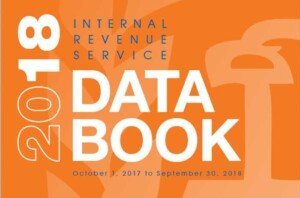What Are Your Chances of Being Audited? The Latest Statistics from the IRS
Every year the IRS releases its Data Book with useful statistics about the IRS’ activities, money spent and collected, taxpayer attitudes, and other data. For taxpayers, there was good and bad news depending on your perspective. In Fiscal Year 2018 (FY 2018), IRS staffing and audits were down, but hiring is looking to start up again and the use of automated software programs is flagging under-reported income and bringing in billions of dollars in extra tax revenue.

- The IRS processed more than 250 million tax returns, collected nearly $3.5 trillion, and issued more than 122 million refunds amounting to almost $464 billion.
- The IRS handled almost 55 million taxpayer calls and its website, IRS.gov, had more than 608 million visits.
- 80% of taxpayers say they were somewhat satisfied or satisfied with their personal interactions with the IRS.
- In 2018, the IRS audited 0.5 percent of the 196 million returns filed in calendar year 2017. An analysis by the Urban Institute-Brookings Tax Policy Center blog found that audits were down 10 percent from 2017, 42 percent from 2010, and two-thirds from a half-century ago. The biggest drop in audits were among the highest-income taxpayers (those with incomes over $200,000). In addition, filers with incomes under $25,000 were audited at a higher rate than filers reporting incomes up to $500,000.
- In 2018, taxpayers proposed 59,000 offers in compromise to settle existing tax liabilities for less than the full amount owed. IRS accepted 24,000 offers, amounting to approximately $261.3 million, during the year.
- The IRS assessed close to $29.3 billion in civil penalties. Almost $12.0 billion was assessed in civil penalties on individual and estate and trust income tax returns. However, the IRS abated almost $12.0 billion in civil penalties during the year, including more than $2.0 billion in abatements for estate and trust income tax returns.
- The enforcement budget fell from $5.5 billion in 2010 to $4.7 billion in 2018. The agency’s workforce was 22 percent smaller than in 2010, and its enforcement staff was down by about one-third.
Notwithstanding this data, a recent town hall at the New York City Bar Association indicated that the IRS is hiring again with incremental increases in funding over the next 10 years. That seems likely to result in more audits in the future. The National Taxpayer Advocate (NTA) also reported that among her concerns is the IRS is not doing enough to identify and assist taxpayers who may be experiencing economic hardship while owing a tax liability. For more on this topic, read the NTA Annual Report to Congress.
Essentially, little has changed. Taxpayers should respond promptly if they receive a notice from the IRS and consult an experienced tax attorney. There are options for resolving your tax dispute, but it is important to act quickly to minimize adverse collection actions.
Contact us for a consultation if you owe back taxes.


